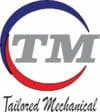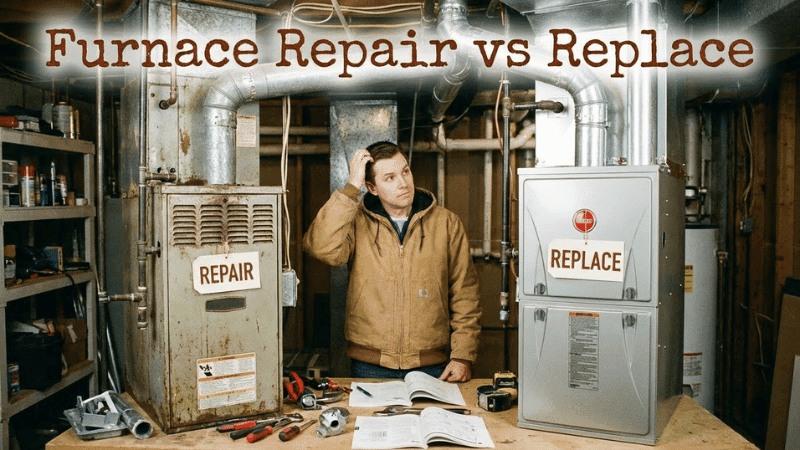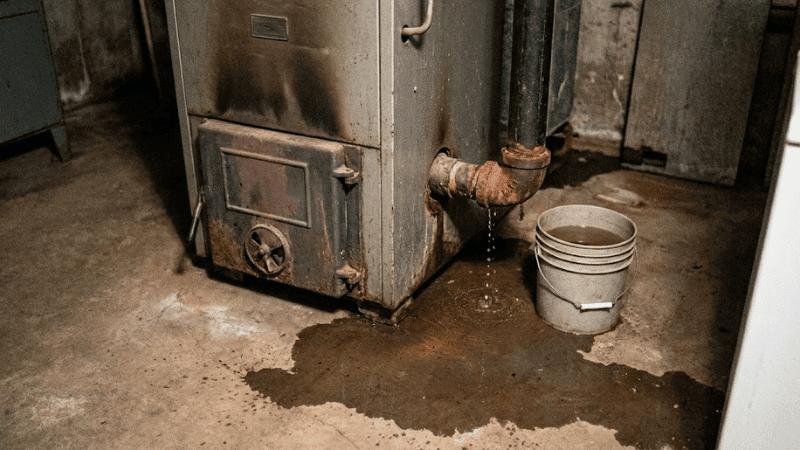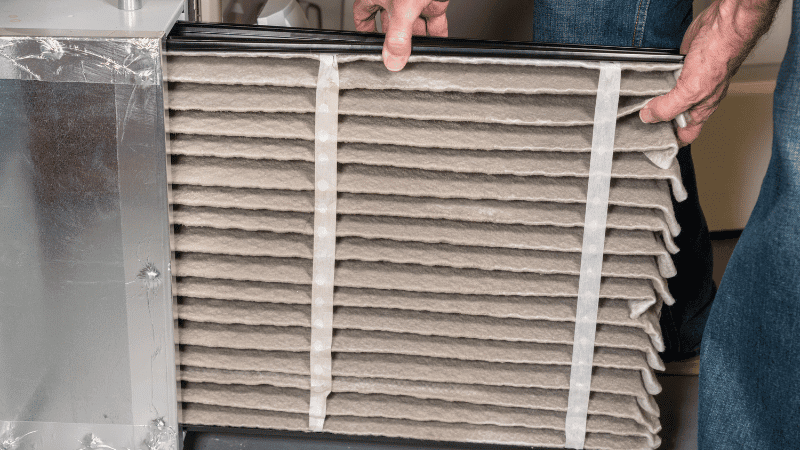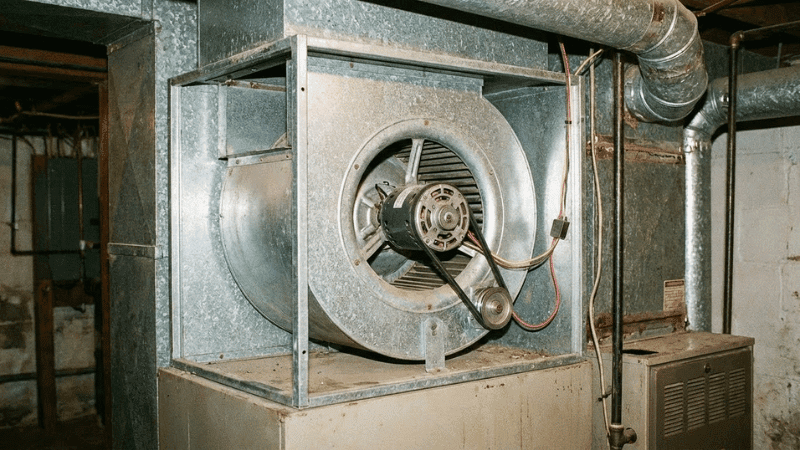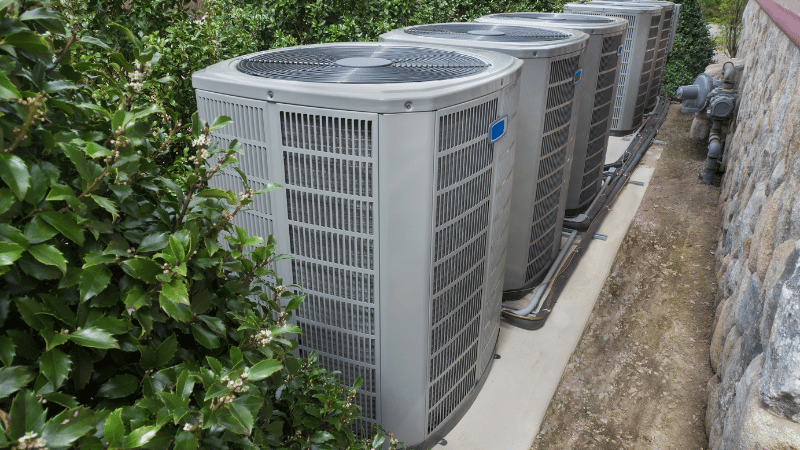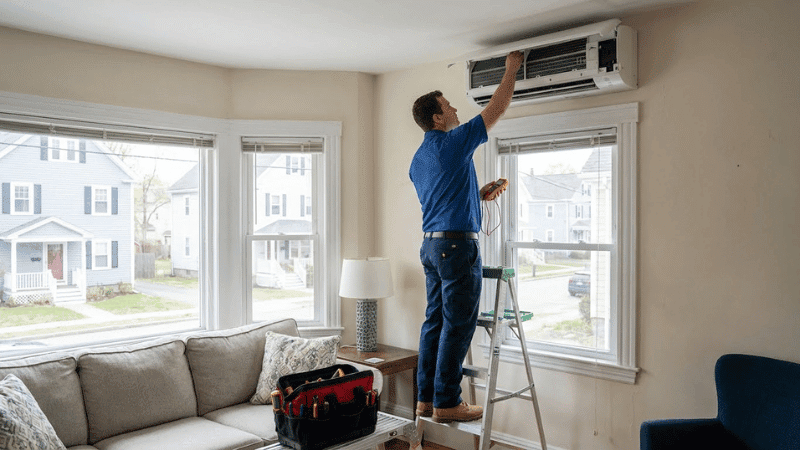What are the most common HVAC repairs?
Your HVAC system works hard year-round cooling your home in the summer and keeping it warm in the winter. But like any complex machine, it’s vulnerable to wear, strain, and unexpected issues. The good news? You can avoid emergency HVAC repair costs by understanding the most common HVAC repairs and how to prevent them.
Ignoring issues like clogged drain lines or a dirty air filter may lead to a full system shutdown or costly compressor failure. And when your smart thermostat starts misbehaving or the blower motor won’t stop running, it’s a clear sign your system needs attention.
Here’s why staying informed matters:
- Prevents unexpected breakdowns
- Boosts energy-efficient HVAC operation
- Helps you identify when to call a qualified HVAC technician
- Extends the life of your unit
Quick Comparison: DIY vs Professional Repair
Issue | DIY Possible? | Call Technician? |
Dirty Air Filters | ✅ Yes | 🚫 Not necessary |
Blown Fuse / Breaker | 🚫 No | ✅ Yes |
Thermostat Programming | ✅ Sometimes | ✅ If persistent issue |
Compressor Failure | 🚫 No | ✅ Always |
Whether it’s a tripped breaker, a faulty thermostat, or a refrigerant leak, being proactive can save time, money, and a lot of discomfort.
Electrical and Power-Related Failures
Let’s face it your HVAC system doesn’t run on magic. It runs on electricity. And when something goes wrong with the electrical components, things can get weird fast. Think of this section as a backstage tour of the power-related problems that could be crashing your home comfort show.
1. Blown Fuses & Tripped Breakers
A blown fuse or tripped breaker is your system’s way of saying, “I’m overwhelmed!” These tiny parts protect your HVAC unit by cutting the power when there’s a surge or overload.
Here’s what might cause it:
- A clogged air filter putting extra strain on the system
- An overworked blower motor
- Faulty wiring
If your furnace or AC keeps tripping the breaker, don’t just reset it over and over. Call a qualified HVAC technician to uncover what’s behind the overload.
2. Faulty Capacitors and Relays
Capacitors are like tiny batteries inside your HVAC system. They give major components like the compressor or fan motor the electrical push they need to start up.
Common signs of capacitor failure:
- Clicking noises at startup
- AC taking forever to turn on
- The unit struggles, then shuts off
When your capacitors or relays go bad, your system might try to run, but it won’t succeed. And forcing it to work in this state can lead to further electrical problems.
3. Ignition System or Pilot Light Failure
If you’re rocking a gas furnace, the pilot light or ignition system plays a huge role. A weak flame or faulty igniter means no heat especially on cold winter nights.
Why it fails:
- Dirt or rust buildup on sensors
- Worn-out thermocouples
- Electrical glitches
Modern systems often rely on electronic ignition, which needs a steady current and proper sensor function. If it fails, your heating cycle is a no-go.
Understanding these electrical issues isn’t just for electricians. It’s for every homeowner who wants to dodge bigger HVAC disasters. The good news? Most of these issues give early warning signs you just have to know what to listen (and look) for.
Mechanical Component Wear and Tear
Your HVAC system might not have moving lips, but if it could talk, it would probably say, “Maintenance, please!” Just like your car, your HVAC is packed with mechanical components that keep things running smoothly until they don’t.
Let’s break down the common mechanical repairs that can turn your comfort into chaos.
1. Blower Motor Issues
The blower motor is the muscle behind your HVAC unit’s ability to push air throughout your home. If the air isn’t flowing or worse, it’s always flowing your blower relay might be the troublemaker.
Signs of blower problems:
- Weak or no airflow from vents
- The fan never turns off (check if your thermostat is set to “on”)
- Loud rattling or humming noises
These issues could stem from relay failure, motor strain, or worn-out bearings. Left unchecked, they lead to bigger headaches like overheating or even system shutdown.
2. Compressor Failure
Think of the compressor as the heart of your cooling system. It pumps refrigerant through the coils to keep your space nice and chilly. But compressors aren’t invincible.
Here’s what can cause compressor failure:
- Refrigerant undercharge or overcharge
- Electrical issues from a faulty capacitor
- Lack of routine maintenance
If your AC is blowing warm air or making a harsh buzzing sound, your compressor might be crying for help. And sadly, this one’s often an expensive repair so catching it early can save you a big bill.
3. General Wear and Tear
Every part in your system from belts to motors to coils is subject to good old-fashioned wear and tear. HVAC systems work year-round, and eventually, time takes its toll.
Common parts that wear out:
- Belts: These drive components like fans and can loosen or snap
- Bearings: Worn bearings can cause grinding noises and overheating
- Motors: Over time, motors lose efficiency and may burn out
Skipping preventive maintenance? Then you’re inviting these issues to show up early. The more your system struggles to work with tired components, the more energy it consumes and the harder it is on your wallet.
Understanding your system’s mechanical health helps you stay one step ahead of breakdowns. Routine inspections and cleanings can spot these issues before they spiral into full-blown emergencies.
Airflow and Filtration Problems
Airflow might not sound exciting, but when your HVAC system can’t breathe properly, things go downhill fast. Your comfort, your air quality, and your energy bill all take a hit. And guess what? Most airflow and filtration problems are totally preventable.
1. Dirty Air Filters
Let’s start with the most common offender: the dirty air filter. This little component has a big job trapping dust, pollen, and debris before they reach the sensitive parts of your system. But when it gets clogged, your blower motor has to work overtime.
Here’s what a clogged filter can cause:
- Reduced airflow through your vents
- Overheating HVAC components
- Higher energy bills
- Poor indoor air quality
Regularly replacing your filters is a preventive HVAC service that pays off big time. It’s cheap, quick, and something you can even do yourself!
2. Dirty or Blocked Coils (Evaporator & Condenser)
Next up: evaporator and condenser coils. These unsung heroes transfer heat to keep your home comfortable. But over time, they gather dirt, dust, and even mold. And when they’re covered in gunk, your system struggles to cool effectively.
Watch for these signs:
- AC running non-stop
- Warm air blowing from vents
- Frozen coils or puddles around the unit
Neglecting coil cleaning causes the system to work harder, leading to mechanical wear, compressor failure, and yep higher electric bills.
Pro tip: Schedule an annual tune-up with a qualified HVAC technician who can clean the coils, check for leaks, and keep everything running efficiently.
3. Blocked Vents or Registers
Sometimes, the problem isn’t with your HVAC unit it’s with your furniture layout! Blocking vents or registers with rugs, couches, or curtains can seriously mess with your airflow distribution.
Quick fixes:
- Uncover all supply and return vents
- Keep at least 10 inches of clearance around each register
- Check ductwork for any visible obstructions
Healthy airflow means a healthier, more efficient system and a comfier home. These small problems may seem harmless at first, but left unchecked, they can spiral into much bigger repairs
Thermostat and System Communication Failures
Your thermostat is basically the brain of your HVAC system. It tells everything else when to start, stop, heat, or cool. But when that brain gets confused or stops working altogether, things can get uncomfortable fast.
Common Thermostat Malfunctions
Here’s the thing: even a tiny thermostat issue can make your whole system seem broken. You might be sweating or freezing and blaming your furnace or AC, but in reality, it could just be:
- Dead batteries in your programmable thermostat
- Misconfigured settings
- A tripped circuit breaker supplying power to the unit
- A faulty sensor giving false temperature readings
Sometimes, your system might not respond at all. Or it might keep running long after it should’ve shut off. These are signs your thermostat isn’t communicating properly with your HVAC system.
Smart vs Traditional Thermostats
Today’s smart thermostats offer better energy efficiency and easy scheduling. But even they can have issues especially with Wi-Fi connectivity or incorrect wiring.
Meanwhile, older thermostats might get stuck, stop reading temperatures accurately, or simply wear out over time.
When to Call a Pro
If your thermostat screen is blank, the temperature around the house is wildly inconsistent, or your system isn’t turning on, it’s probably time to contact a qualified HVAC technician.
A quick inspection can reveal whether it’s just a small fix or time for a sleek, smart upgrade that could actually lower your energy bills.
Water-Related Issues
When you think of HVAC repairs, water probably isn’t the first thing that comes to mind. But trust us water-related issues like a clogged drain line can lead to some serious (and soggy) problems.
Your HVAC system produces condensation as it cools your home. This water needs to drain properly, usually through a condensate line. But when that line gets blocked by dirt, mold, algae, or even a rogue insect nest, the water has nowhere to go. It backs up, overflows, and yep leaks all over your floors, ceilings, or wherever the indoor unit is located.
Here’s how to know you’ve got a drainage issue:
- You see water pooling around your indoor HVAC unit
- The system shuts off randomly
- Musty smells start to creep in
Ignoring it can lead to water damage, mold growth, or even electrical problems if moisture reaches the wrong components.
To avoid this mess, include drain line cleaning in your seasonal HVAC maintenance. A qualified HVAC technician will clear the line, flush the system, and make sure everything is draining like it should.
This small step can prevent big headaches and big repair bills down the road.
Preventive Maintenance Tips to Avoid Common Repairs
Let’s be honest no one wants to deal with surprise HVAC repairs, especially when it’s the hottest day of summer or the coldest night of winter. The good news? You can avoid many of these breakdowns by sticking to some smart, simple preventive maintenance habits.
A little care goes a long way in protecting your system from things like compressor failure, blower motor issues, or a clogged drain line. Think of it like changing the oil in your car you don’t skip it, right?
Here’s what to do:
- Change your air filters every 1–3 months
A dirty air filter restricts airflow, forces your system to work harder, and increases wear on the blower motor. - Schedule annual HVAC tune-ups
Have a qualified HVAC technician inspect your coils, capacitors, thermostat, and more. Early detection prevents expensive repairs later. - Clean your condensate drain line
Prevent clogs and overflow with a seasonal flush to keep water moving freely. - Inspect vents and registers
Make sure nothing’s blocking airflow. Rearrange furniture or curtains if needed. - Test your thermostat
If you’re still using an outdated model, upgrading to a smart thermostat can improve energy efficiency and help prevent system miscommunication.
Preventive care isn’t just about avoiding emergencies it also makes your system run more smoothly and saves money in the long run. A well-maintained system uses less energy, has fewer service calls, and lives a lot longer.
If you’re not comfortable doing these checks yourself, no worries. Most HVAC companies offer maintenance plans that include all the essentials and some even give you priority service when something does go wrong.
When to Call an HVAC Technician
Sometimes, DIY fixes just don’t cut it. When your HVAC system starts acting up beyond a clogged filter or a quick thermostat reset, it’s time to bring in the pros.
Here are clear signs you need a qualified HVAC technician:
- Warm air when you’re expecting cool
- Odd noises like banging, hissing, or buzzing
- Breaker keeps tripping
- Water leaks around the indoor unit
- Thermostat unresponsive or inconsistent temperatures
If you’re noticing any of these red flags, delaying service can turn a minor issue like a faulty capacitor or refrigerant leak into a major HVAC system breakdown.
Calling a professional ensures:
- Accurate diagnostics using the right tools
- Safe repairs for electrical or gas components
- Protection of your warranty and system lifespan
Don’t wait for a total system shutdown. A quick call can save you time, money, and a whole lot of stress.
What to Expect During an HVAC Service Call
Calling an HVAC technician for the first time? Here’s what usually happens it’s quick, professional, and worth every penny.
During a service call, expect the technician to:
- Inspect electrical components like capacitors and fuses
- Check for refrigerant leaks or clogged drain lines
- Test the thermostat, blower motor, and compressor
- Clean coils, replace air filters, and verify airflow
You’ll also get a clear diagnosis, an honest quote, and tips to avoid future problems. It’s not just a repair it’s a complete HVAC system check-up to keep your home running smoothly.
